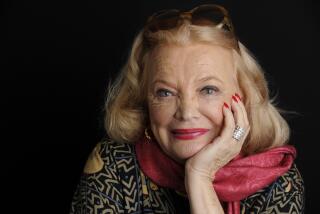John Cassavetes, Actor, Film Maker, Writer, Dies at 59
- Share via
John Cassavetes, the innovative film maker deeply admired by some but scorned by others for such off-center movies as “A Woman Under the Influence” and “Faces,” died Friday at Cedars-Sinai Medical Center. He was 59.
Actress Gena Rowlands, to whom he had been married since 1958 and who had starred in most of his films, was with him when he died about 10 a.m., said his publicist, Esme Chandlee.
Chandlee said Cassavetes died from complications of cirrhosis of the liver. She said he had been in poor health for three years.
Cassavetes, who once called himself a “professional” actor and an “amateur” director, was a method actor known for such roles as the ambitious actor-husband in “Rosemary’s Baby,” the 1968 film that starred Mia Farrow.
He also appeared with Rowlands, Susan Sarandon and Molly Ringwald in “Tempest,” Paul Mazursky’s film adapted from the Shakespeare play.
Chandlee said Cassavetes was one of the few ever nominated for Academy Awards in three categories--for best writer for his screenplay “Faces” (1968), for best supporting actor in “The Dirty Dozen” (1967) and for best director for his film “A Woman Under the Influence” (1974).
The last film, Chandlee said, was Cassavetes’ most commercial effort and the favorite of both Cassavetes and Rowlands, its star. Chandlee quoted the director as saying he had seen it 30 times and could not look at it any more because it was “too powerful an experience.”
In a 1980 interview, Cassavetes said: “I always feel left out of most movies. They have nothing to do with me.” He added that he felt he and his associates had “made a difference” in movie making. “I don’t think films are the same as when we started out,” he said.
Cassavetes certainly was not shy about his own work. “I would put my pictures up against anybody’s in this world,” he said in the interview. “Certainly in my own day I bow to no one. I don’t think there’s another director in the world who works harder to make better films than I do.”
1960 Directing Debut
After acting in films and on television since 1953, he turned to directing with the experimental “Shadows” in 1960, about a black girl living in New York with her two brothers. Shot on a shoestring ($40,000), “Shadows” had no script and was improvised by a cast of Cassavetes’ proteges.
It was grainy and crude, but it won the Critics’ Award at the 1960 Venice Film Festival and gained Cassavetes an immense amount of recognition in Europe as a pioneer of realism in American films.
Cassavetes then directed two unsuccessful Hollywood films, “Too Late Blues” with Bobby Darin and “A Child is Waiting” with Judy Garland and Burt Lancaster, before writing, producing and directing his second independent film, “Faces,” a study of the marriage of two people unable to communicate with each other.
Like “Shadows,” it was shot in black-and-white 16-millimeter, then blown up to 35-millimeter. It had a script, but Cassavetes allowed his actors to do a lot of improvising. Rowlands was one of the stars of “Faces.” It captured five awards at the 1968 Venice Film Festival and three Oscar nominations.
Reviewer Alex Ross, writing in Maclean’s magazine, called it “the longest, most ambitious, most brilliant home movie ever made.”
A Los Angeles Times writer, on the other hand, called it “an Excedrin headache, a too-long, strident, self-indulgent, raw but emotionally lucid look at a marriage no more misshapen than most but fraught with all the signal existential terrors of modern life.”
In 1969, Cassavetes filmed “Husbands,” which he wrote and directed. It starred Peter Falk, Ben Gazzara and Cassavetes himself. It dealt with three men who drunkenly face their own mortality when a friend dies.
‘Rebellious Perversity’
Falk told a reporter at that time that Cassavetes “has a rebellious perversity, but it’s an intelligent rebellious perversity . . . He’s healthy . . . the healthiest man I know.”
Cassavetes also directed such films as “The Killing of a Chinese Bookie” (1976), “Opening Night” (1978), “Gloria” (1980) and “Big Trouble” (1985).
He was seen as an actor in 20 films, including “Taxi” (1953), “Affair in Havana” (1957), “The Killers” (1964), “If It’s Tuesday, It Must be Belgium” (1969), “The Fury” (1978) and “Brass Target” (1978).
Cassavetes, born in New York City, was a son of Greek immigrants. He was a film buff as a boy and studied acting at the New York Academy of Dramatic Arts. He finally landed a bit part in the film “Taxi” and won the lead as a brooding young bullfighter in a dramatic vignette on an “Omnibus” television show.
That role led to others on “Playhouse 90,” “Studio One,” “Kraft Theatre,” “Alcoa Theatre” and others.
He and Rowlands have three children: Nicholas, Alexandra and Zoe.
Private funeral services will be held Monday at Westwood Memorial Park.
More to Read
Only good movies
Get the Indie Focus newsletter, Mark Olsen's weekly guide to the world of cinema.
You may occasionally receive promotional content from the Los Angeles Times.










